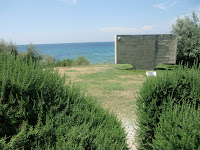On seeing the country in disarray the Greeks must have imagined that it was their ‘time to eat’ and sent out an army from Izmir with the intention of recreating the Byzantine Empire. Initially the Greeks were successful taking Edirne and Bursa and headed on towards Ankara to defeat the Turks once and for all. After several battles the Turkish apparently savaged the Greeks at Dumlupinar and sent them fleeing in retreat to Izmir and expelled them from Anatolia. In retrospect the invasion was just what Mustafa needed to unite the country and once again he emerged as a national hero. The Treaty of Lausanne in 1923 followed leading to foreign powers leaving and the borders of today’s Republic of Turkey being formed.
Even off the battle field Mustafa Kemal’s leadership was impressive. After years of war the country was in disarray and was very impoverished. However, Kemal apparently had a vision that Turkey could be as great as any modern European country and set about this vision with apparent ‘limitless energy’. As a result he abolished the sultanate and later went on to get rib of Arabic and replacing it with a Latin alphabet that was easier to learn. This process of language reform was all aimed at taking the language back to its authentic roots. Both of these acts must have seemed like very bold moves at the time? One of Kemal’s main aim was to improve the lives of Turkish people and as a result he was given the name Atatürk, which means ‘Father Turk’. During his rein Atatürk went on to modernise Turkey taking on the Gregorian calendar, reforming the language, banning the fez (as it was seen as an image of the Ottoman Empire) and many other things. Another part of his vision was for the country to be a solely Turkish state. However, this denied the Kurds in the southeast any cultural existence (even though many Kurds had fought courageously) and has to this day it has lead to unrest in this region. This vision also meant that many Greeks were displaced in the south west of the country and as a result a few skirmishes with the Greeks have followed.
No doubt the combination of battle and inspirational leadership must have taken their toll because he died at the young age of 57. Atatürk lived up to his vision of modernising and improving the country. As a result the Turkish people still love him and everywhere you go in Turkey you see buildings and streets gratefully named after him and his legacy.
I am far from an expert on Atatürk but from the little I know about him his leadership and vision was inspirational. Looking at the other leaders that surrounded him at that time i.e. Hitler, Mussolini and Stalin his great example of leadership makes him stand out as high as a sunflower in a field of thistles. He highlights how a good leader can make such a difference to a country (I know I can think of more bad leaders than I can good ones). At times he showed great ruthlessness on the battlefield ordering roughly 600 of his men who had run out of ammunition to carry on fighting to the death (according to Annal this move was strategic, allowing enough time for reinforcements to arrive and secure the battle field) but he also showed great forethought and compassion for his people and his opponents. In 1934 he sent this message to the mothers of the Allied soldiers who had died at Gallipoli which is now engraved on a huge plaque in Gallipoli:
 ‘Those heroes that shed their blood and lost their lives you are now lying in the soil of a friendly country, therefore rest in peace. There is no difference between the Johnnies and the Mehmets to us where they lie side by side here in this country of ours. You the mothers who sent their sons from far away countries wipe away your tears. Your sons are now lying in our bosom and rest in peace. After having lost their lives on this land they have become our sons as well.’ Atatürk, 1934.
‘Those heroes that shed their blood and lost their lives you are now lying in the soil of a friendly country, therefore rest in peace. There is no difference between the Johnnies and the Mehmets to us where they lie side by side here in this country of ours. You the mothers who sent their sons from far away countries wipe away your tears. Your sons are now lying in our bosom and rest in peace. After having lost their lives on this land they have become our sons as well.’ Atatürk, 1934.What have I taken away from Atatürk’s example? Well I’ve been thinking about that during the many miles we have travelled around this amazing country. Atatürk reminds me that in life one person can strive to make a difference - no matter what we do. All it takes is the right mindset, a good vision, energy and plenty of enthusiasm and I’m going to try to remember his example.
Posted by Colin
Great post and reflection. The philosophy is very like that of Saladin (compassion and empathy for adversaries) - it's a shame we are currently conditioned to fear Islam(ists) in the UK (by media furore, generalisation and hype) - there is (as you know as an overland travellers) always more to learn from others' history and culture than there ever is to fear.
ReplyDelete